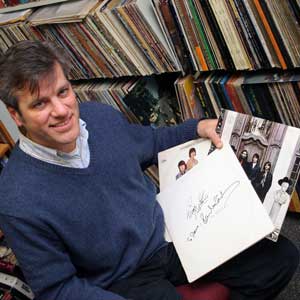 |
| Music professor Steve Baur in his office. (Pearce photo) |
Steve Baur is too young to remember the debut of The Beatles on the Ed Sullivan Show or JohnÕs LennonÕs ÒWeÕre-more-popular-than-Jesus” crack of 40 years ago.
But as a kid with a really nice older sister, The Beatles have been "speaking words of wisdom” to the future Dr. Rock ÔnÕ Roll ever since he can remember.
Back in the late 1970s in Los Angeles, local radio station KHJ tantalized with a contest promising the full Beatles library. ÒIÕd listen to the radio all day long. It was one of these things, ÔBe the eighth caller to win!Õ and I tried and tried and tried,” recalls Dr. Baur, 40, assistant professor of popular music at Dalhousie. ÒOne day, I had to go out and my sister Kathy told me, ÔIÕll win those records for you, Steve!Õ And she did. I loved those albums and so did my brother, Michael.”
BaurÕs Beatles Bites:Fave album: ÒThe one I come back to the most is Rubber Soul (1965)” Fave Beatle: ÒRingo!” Baur bears the calluses of a rock ÔnÕ roll drummer. Why they matter: ÒThe Beatles are part of the moment when rock ÔnÕ roll took a serious stand and tried to use music as a tool for change.” |
ÒThe Beatles transformed popular music into art and used that art to address serious topics,” says Dr. Baur. Some examples? The Beatles ponder love of community and togetherness in songs like All You Need is Love and I Am the Walrus; consumer culture (Money CanÕt Buy Me Love); social activism (Revolution); and existentialism (Across the Universe). The Beatles also exposed many to Eastern philosophy, singing ÒTurn off your mind, relax and float down stream,” in Tomorrow Never Knows.
ÒIn some ways, they were typical hippies singing about peace, love and justice. But the fact they did that so simply doesnÕt mean they werenÕt tackling profound topicsÉ They were trying to bang heads against walls and saying, Ôthink!Õ”
